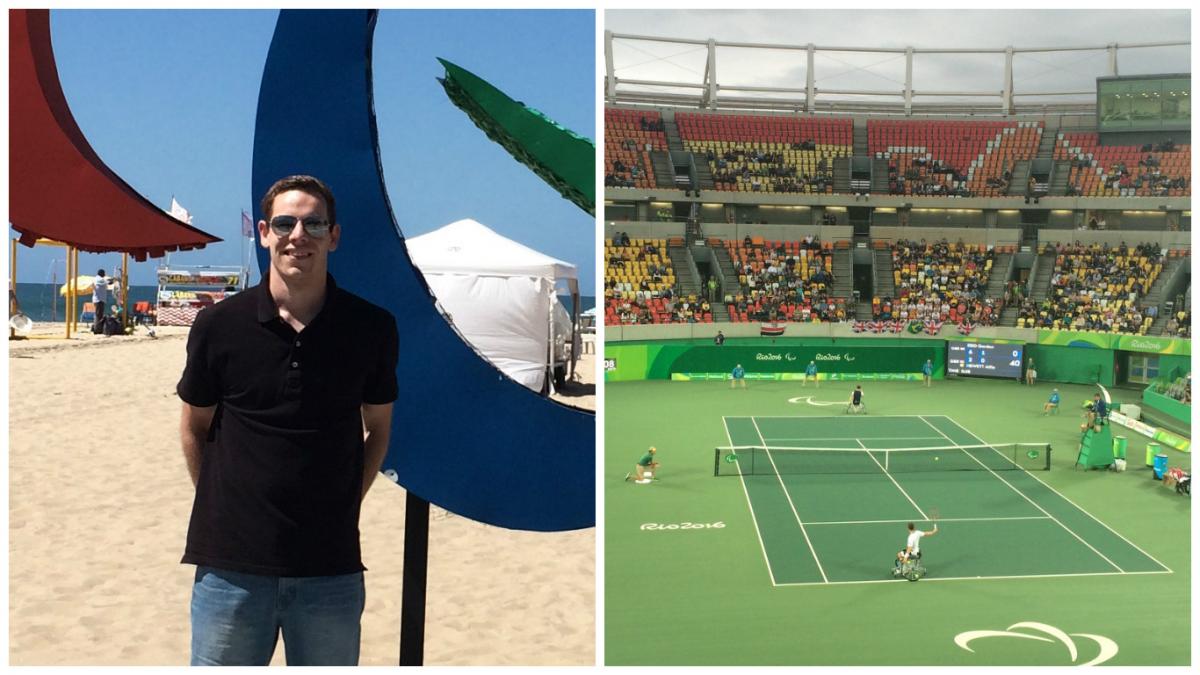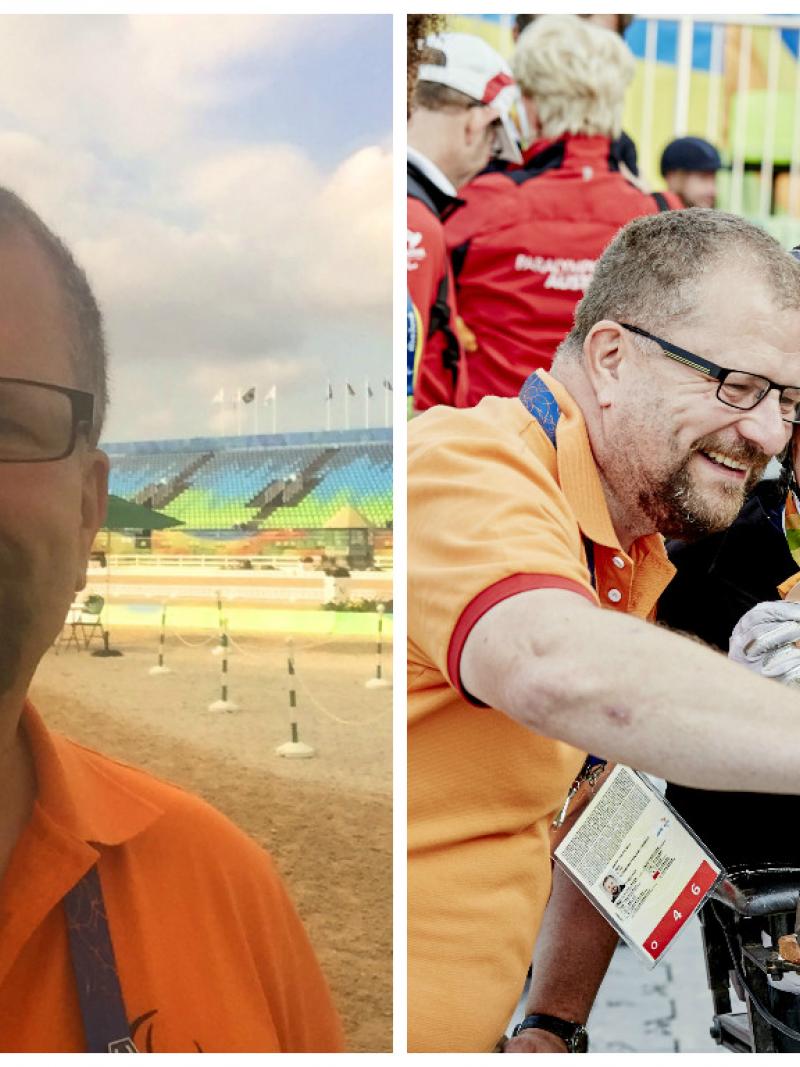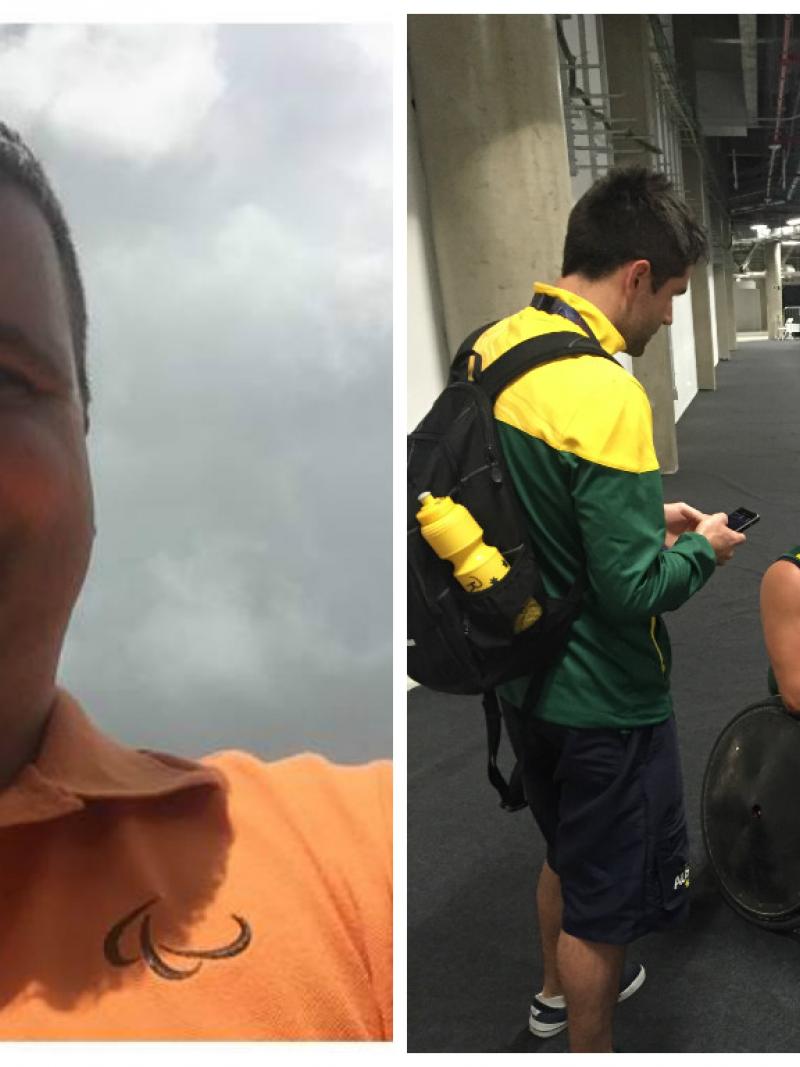Andrew Cross: Fast-paced, busy… and a Brazilian bonanza
The IPC’s volunteer writer shares his experience covering wheelchair tennis at Rio 2016. 26 Oct 2016
IPC volunteer writer Andrew Cross at the Rio 2016 Paralympic Games. Cross covers wheelchair tennis for the IPC.
Four years ago I spent the summer attending and watching the London 2012 Olympics and Paralympics; completely unaware of the path I would take in the following four years.
The journey began at the University of Huddersfield, Great Britain, where I studied sports journalism for three enjoyable years and made some decisive life choices – one of them to apply to become an International Paralympic Committee (IPC) volunteer writer in October 2013.
Just a year after starting the university course, I was given wheelchair tennis to report on for the IPC; a sport which I had never watched before, but a sport which I am now hooked on.
Alongside my university work I continued to expand my knowledge and passion for wheelchair tennis; researching, interviewing and writing about the talents from all corners of the globe. From Japan to Argentina; South Africa to France; it was amazing to learn about the world stars, the multi-champions and the Paralympic medallists, who were unknown to the mainstream sports media world.
After two years of wheelchair tennis reporting and shortly before landing my role as media executive at Bradford Bulls rugby league club, I got a phone call. A call which I do not think many 21-year-olds fresh out of university expect to get.
“Andy, we’d like to bring you out to Rio and cover wheelchair tennis at the Paralympics for us.”
And just like that the journey to Brazil, to Rio, to the 2016 Paralympics was set in motion.
Fly forward 10 months and a 14-hour flight, I was overlooking the Olympic Park from my hotel room getting ready for the Opening Ceremony in the infamous Maracana Stadium. As a football fan it is one of the stadiums to tick off the bucket list and the performance on show inside Brazil’s home of football did not disappoint.
Colour, music, dance, excitement, entertainment; it was a Paralympic Opening Ceremony to be proud of. It was a Brazilian bonanza made and created by the Cariocas and you could feel them warming to every nation that night.
Following a day to catch up from the Opening Ceremony and find my new surrounds, wheelchair tennis got underway and it was non-stop action on the courts and in the media centre for the following nine days; it was exciting and I was fuelled on adrenaline.
On the first morning of play I managed to get myself involved with the International Tennis Federation (ITF) and quickly became one of their go-to-guys for stats and information on the athletes, and within 30 minutes was writing articles for them as well as the IPC.
The heat was relenting and so was the tennis and it became very easy to immerse yourself in the environment of filing work, watching several games, interviewing the athletes, and sending more copy off to the editors. It was faced paced, busy and I did not want to change it for anything.
Days raced by and the shocks started to happen in the quest for claiming a medal, which meant the athlete interviews became more intriguing and even more emotive – something which was etched across the faces of several athletes.
As well as surprises on the courts, the athletes continued to impress me off it during their interviews. I am used to regimented answers from sports men and women, yet in Rio, the interviews were very much far from scripted. I was getting great stories and brilliant one-liners as the athletes relayed their Rio experience and helped me create some great personal moments in Brazil – Australia’s Dylan Alcott’s Paralympics remaining long in my memory.
I had interviewed Alcott a few times before his two gold medal post-match press duties towards the end of the Games. After his first gold medal victory in the doubles he was buzzing with the adrenaline and gave a great interview finishing it off with “same again tomorrow?”
Twenty-four hours later, and it was “same again” and with a new title – a double gold medallist and two-sport gold medallist – and after all the physical and mental effort he had displayed during the Paralympics he said “cheers Crossy mate, you’re a star! Great reporting this week!”
Myself and the rest of the IPC volunteer writers may not stand on the podium and hold our heads high with a medal around our necks as our national anthem plays, but in that moment it felt like all the hard work and decision making over four years was well and truly worth it.
Throughout the Games you could see what it meant to the athletes to be at Rio 2016 and to take part in an event, which like a lot of them, I never dreamt I would be at either. It was a journey and a phenomenal experience which I still cannot believe I have been on.
Andrew Cross is the beat writer for wheelchair tennis. Follow his work at paralympic.org/wheelchair-tennis/news and follow him on Twitter at @Andy_Cross_ . The IPC volunteer writers programme was launched in 2013 and currently consists of more than 30 volunteers from around the world helping produce content for Paralympic.org.

 Facebook
Facebook
 Instagram
Instagram
 Twitter
Twitter
 Youtube
Youtube
 TikTok
TikTok
 Newsletter Subscribe
Newsletter Subscribe



